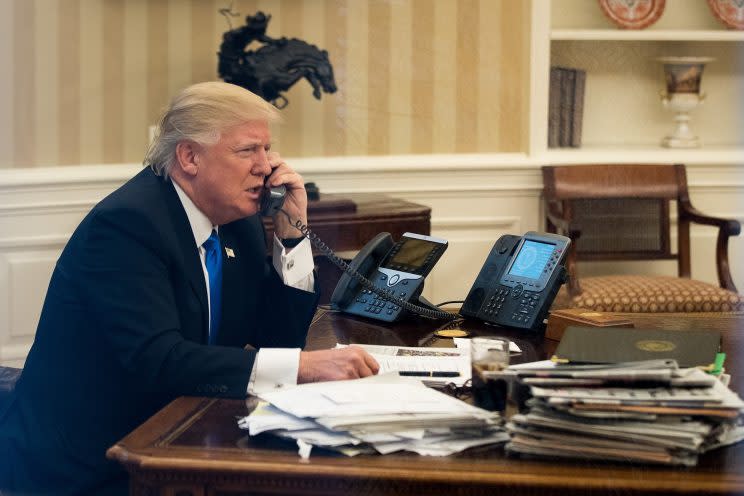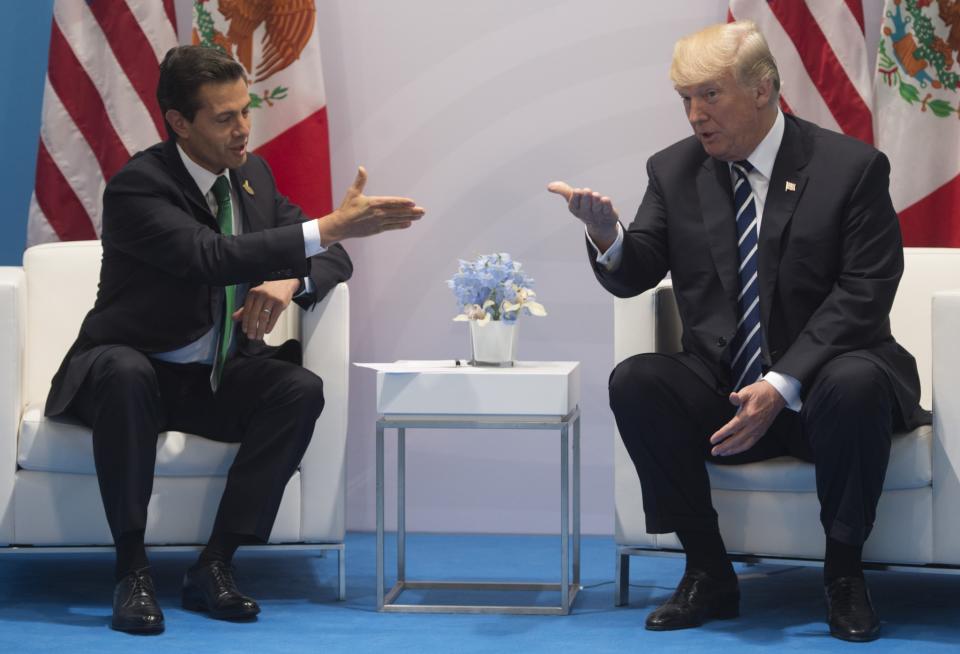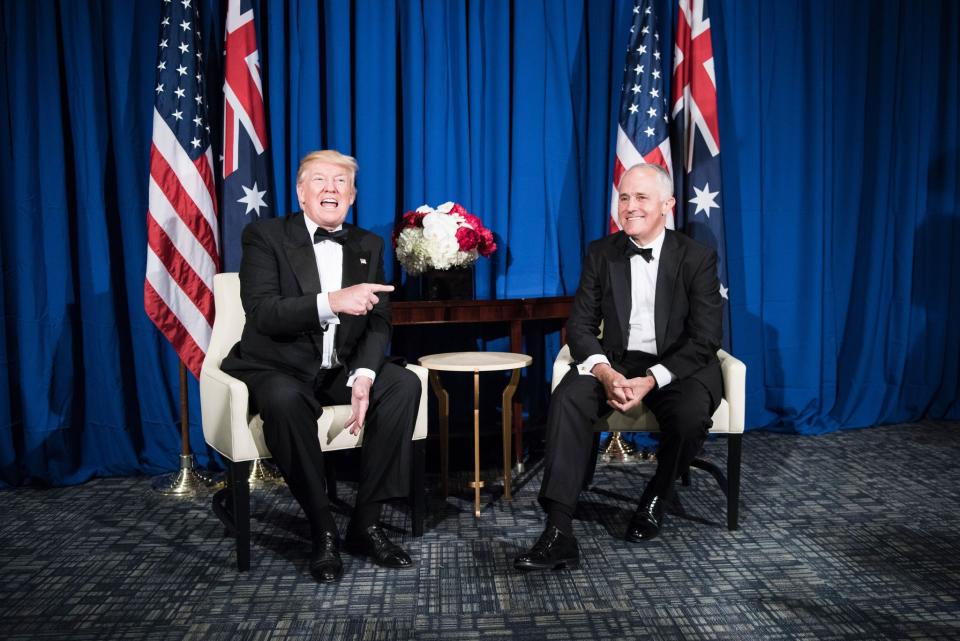The Washington Post published transcripts of Trump’s colorful calls with 2 foreign leaders

Days after his inauguration, President Trump’s conversations with the leaders of Mexico and Australia show a president anxious to live up to the immigration tough talk he touted on the campaign trail.
Transcripts published by the Washington Post on Thursday of the calls between Trump and Mexican President Enrique Peña Nieto of Mexico and Australian Prime Minister Malcolm Turnbull contained strikingly tense exchanges.
Predictably, Trump and Peña Nieto had markedly different views on whether Mexico is obligated to pay for a wall along the U.S.-Mexico border. During the campaign, Trump constantly vowed that Mexico would pay for “100 percent” of the wall’s construction, but the president privately backed off that promise to Peña Nieto.
Despite the disagreement, Trump was friendly toward Peña Nieto, at one point telling him, “It is you and I against the world, Enrique, do not forget.” (He called both foreign leaders by their first names, rather than their titles, throughout both conversations. Both Peña Nieto and Turnbull addressed him as “Mr. President.”)
Trump’s call with Turnbull was notably less cordial. The testiness was reported at the time, but Trump denied it on Twitter, writing, “Thank you to the Prime Minister of Australia for telling the truth about our very civil conversation that FAKE NEWS media lied about. Very nice!” In reality, Trump told Turnbull multiple times that their talk was the “most unpleasant” conversation he had had with a foreign leader all day.
Although the transcripts were widely mocked, some observers argued that such leaks undermine presidents’ ability to have confidential conversations with foreign leaders. “I would’ve lost my mind if transcripts of Obama’s calls to foreign leaders leaked,” tweeted Tommy Vietor, a spokesman for the National Security Council during the Obama administration. “He wouldn’t have sounded so dumb, but it’s still absurd.”
Below are the key takeaways from Trump’s phone calls with Peña Nieto and Turnbull.

Mexico:
Trump cajoles Peña Nieto not to say publicly Mexico wouldn’t pay for the wall.
The conversation between Trump and Peña Nieto took place just days after inauguration, and the president was eager to discuss his signature campaign promise. Peña Nieto has repeatedly and publicly said Mexico will not pay for the wall — a fact Trump said put them both in “a little bit of a political bind.”
“I have been talking about it for a two-year period,” Trump said of his vow. He then suggested both agree, when asked how the wall will be funded, to say, “We will work it out.”
“If you are going to say that Mexico is not going to pay for the wall, then I do not want to meet with you guys anymore because I cannot live with that.”
He seems to admit that the wall is not one of the more significant matters of diplomacy between the U.S. and Mexico: “Believe it or not, this is the least important thing that we are talking about, but politically this might be the most important.”
Peña Nieto pushes back against Trump’s description of a crime-ridden Mexico.
While the two were on the topic of organized crime, Trump painted an apocalyptic picture of Mexico, telling Peña Nieto, “Your citizens are being killed all over the place, your police officers are being shot in the head and your children are being killed.” Peña Nieto dryly responds by pointing out criminals are “being largely supported by the illegal amounts of money and weapons coming from the United States.”
Trump called New Hampshire “a drug-infested den.”
Trump has long tied the opioid epidemic in the U.S. to Mexico, and in his conversation with Peña Nieto, he said the U.S. is “becoming a drug-addicted nation.” He singled out the Granite State.
“I won New Hampshire because New Hampshire is a drug-infested den,” Trump said. Although he did win the state in the primary, he lost it to Hillary Clinton in the general election. He then went on to offer “big-league” help from the U.S. in combating the “pretty tough hombres” in Mexico.
Trump praised Peña Nieto’s command of the English language at multiple junctures.
Early in the call, Trump addressed the interpreter, telling them to stand down because “I think Enrique understands everything I said.” When Peña Nieto answered affirmatively, Trump responded, “He speaks English better than me.”
After Peña Nieto expressed his desire for the two nations to get along, Trump was even more effusive: “You know, we should put that in the statement. Your words are so beautiful. Those are beautiful words, and I do not think I can speak that beautifully, OK?”
Trump urges Peña Nieto not to equate the U.S.-Mexico relationship with the U.S.-Canada relationship.
While the two were on the topic of trade deficits, Peña Nieto brought up NAFTA, the trilaterial trade agreement between Canada, Mexico and the U.S. Trump replied, “Well, Canada is no problem — do not worry about Canada, do not even think about them. That is a separate thing and they are fine and we have had a very fair relationship with Canada. It has been much more balanced and much more fair. So we do not have to worry about Canada, we do not even think about them.”

Australia:
Trump worries about the political ramifications of accepting refugees from Australia.
Most of the conversation between Trump and Turnbull centered on an Obama-era deal in which the U.S. agreed to vet and accept refugees currently imprisoned in Australia for trying to enter the country by boat. Trump stressed that the deal “will make us look awfully bad” after his tough talk on banning refugees.
“This is going to kill me,” Trump said.
He later immodestly quipped: “I am the world’s greatest person that does not want to let people into the country.”
Trump tells Turnbull, “You’re worse than I am,” in reference to Australia’s strict refugee policy.
Turnbull explained to Trump that Australia imprisons refugees who try to enter the country by boat in order to discourage “people smugglers,” an idea that intrigued Trump.
“That is a good idea. We should do that too. You are worse than I am,” Trump said.
Despite Turnbull’s explanation of the policy, Trump later asked him, “What is the thing with boats? Why do you discriminate against boats?”
Turnbull informs Trump that the Boston Marathon bombers came from Russia.
While they were discussing refugees, Trump asked, “Can Australia give me a guarantee that if we have any problems — you know that is what they said about the Boston bombers. They said they were wonderful young men.” Turnbull reminded Trump that the Boston bombers came to the U.S. from Russia.
The U.S. leader replied, “They were from wherever they were.”
Trump doubts resettled refugees will “work for the local milk people.”
“I hate taking these people,” Trump said of the refugees coming to the U.S. “I guarantee you they are bad. That is why they are in prison right now. They are not going to be wonderful people who go on to work for the local milk people.”
Trump makes clear to Turnbull that he did not enjoy their conversation.
“Look, I spoke to Putin, Merkel, Abe of Japan, to France today, and this was my most unpleasant call because I will be honest with you,” Trump said.
Before he signed off, he repeated this assessment.
“I have had it,” Trump said. “I have been making these calls all day and this is the most unpleasant call all day. Putin was a pleasant call. This is ridiculous.”
_____
Read more from Yahoo News:



